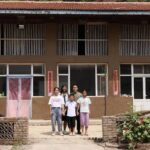As Shougang Park, a steel mill-turned cultural and sports complex in Shijingshan district of Beijing, was reopened after the conclusion of the Beijing 2022 Winter Olympics, many citizens have visited the industrial park to relive the atmosphere of those exciting competitions.
Because of its unique design features and impressive industrial landscape in the surrounding area, Big Air Shougang, a venue for Beijing 2022 in the industrial park, attracted a lot of attention during the Games.
The Shougang Park, which used to be the production premises of Chinese steelmaker Shougang Group, has been praised by International Olympic Committee (IOC) President Thomas Bach for realizing a perfect combination of competition venue, reuse of industrial heritage, and urban renewal.
The industrial park has witnessed how the Winter Olympics has driven the upgrading and development of Beijing. To support Beijing in bidding for the 2008 Summer Olympics and promote the transformation, development and environmental protection of the Chinese capital city, Shougang Group decided to relocate its main production premises and started to explore comprehensive transformation in 2003.
Since 2015, when Beijing won the bid to host the 2022 Winter Olympics, Shougang Park has embraced new development opportunities. It has been rejuvenated by a nation-wide frenzy for ice and snow sports. Its ironmaking raw material area was turned into headquarters of the Beijing Organising Committee for the 2022 Olympic and Paralympic Winter Games (BOCOG) and clean coal plant became training field of national ice and snow sports teams. These transformations of the industrial park symbolize the precious legacies of the Winter Olympics and vividly reflect Beijing’s high-quality development.
The preparations for the Beijing Winter Olympics during the past over six years have contributed a lot to the coordinated development of the Beijing-Tianjin-Hebei region.
The Beijing-Chongli Expressway and Beijing-Zhangjiakou high-speed railway makes it possible for residents to travel between Beijing and Zhangjiakou city, north China’s Hebei province within an hour; the Zhangbei renewable energy flexible DC grid test and demonstration project in Zhangjiakou has been put into operation; and focusing on treating air pollution, desertification and water pollution, Beijing, Tianjin and Hebei have strengthened joint efforts for the management and protection of the ecological environment in the region, which have yielded more and more fruits.
As people’s passion for winter sports fuels development, the Beijing-Tianjin-Hebei region is gathering pace in pursuing a scientific and sustainable path for coordinated development. Practice has proved that by complementing one another with their respective advantages and striving for mutual benefits, the three parties involved will certainly embrace a bright future for coordinated regional development.
Hosting a safe and splendid Winter Olympics and promoting high-quality regional development have been two important and indispensable tasks for China.
Preparations for Beijing 2022 have accelerated Beijing and Zhangjiakou’s transportation infrastructure connectivity, joint prevention and control of ecological environment, complementarity and mutual promotion of industrial development, and joint construction and sharing of public services, achieving a win-win result for both the Olympic Movement and regional development, according to Legacy Case Studies: Olympic and Paralympic Winter Games Beijing 2022, a reported jointly compiled by the BOCOG and Beijing Sport University.
Gaojinglu community in Guangning subdistrict, Shijingshan district, has developed itself into a community featuring Winter Olympics by expanding public activity space, renovating sports facilities, and improving living environment; Zhangjiakou city has pushed ahead with the construction of 5G networks, which not only served the Winter Olympics, but promoted the upgrading of traditional industries and facilitated the construction of a modern industrial system; Chongli district in Zhangjiakou city took the 2022 Winter Olympics as an opportunity to develop ice and snow sports, helping every one out of five local people find a job in winter sports industry.
Facts have shown that the coordinated development of the Beijing-Tianjin-Hebei region is the premise and foundation for the success of the 2022 Winter Olympics, and the success of the Games has in turn given a boost to the coordinated development of the region.
The improvement in infrastructure and social atmosphere, such as roads, transportation, electric power, public services and social etiquette, has further solidified the foundation for coordinated regional development. At the same time, the 2022 Winter Olympics is creating and bringing many tangible and intangible benefits to the public, cities involved and coordinated regional development.
The Shougang Park will carry out extensive mass fitness activities, sports events, professional training as well as business and cultural activities to build a new landmark of Beijing in the new era; Yanqing district, Beijing, will promote the integrated development of venues for the Winter Olympics, the Beijing Expo Garden Park, and the Great Wall while boosting the development of technologies for ice and snow sports, new energy and other industries and the construction of beautiful countryside; Zhangjiakou city has built an ice and snow sports equipment manufacturing base, driving the development of industries such as snowcat, snowmaker, snowboard, and skating equipment.
By making good use of the legacies of the Winter Olympics and giving full play to its role in driving the development of related industries, Beijing will be able to continuously cultivate new drivers for development and lift the coordinated development of the Beijing-Tianjin-Hebei region to a new level.
Beijing has succeeded in promoting the benign interaction between the Winter Olympic Games and the host cities, for which it has won praises from IOC officials.
The rich legacies of the Games are generating long-term benefits for more and more people and infusing new vigor into high-quality urban development and coordinated regional development.



